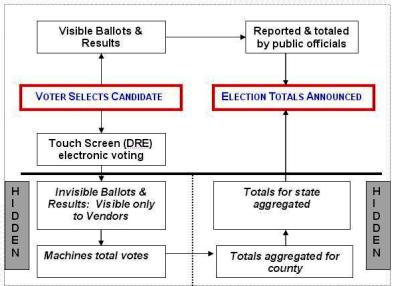Q&A Session with a Commissioner of the Elections Assistance Commission Reveals Massive Violations of Citizen Rights
Secret Vote Counting Crammed Down the Throat of Democracy
Special Report for “Scoop” Independent Media
First in a Series on HAVA and the EAC
by Michael Collins
Washington, DC
CONTENTS:
-
INTRODUCTION:
- THE QUESTIONS
AND ANSWERS: Citizen Paul Lehto, Questions Ray Martinez,
Attorney-at-Law and Commissioner, Election Assistance
Commission.
- THE IMPLICATIONS:
The Citizen Lehto - Commissioner Martinez
Exchange.
- CRAMDOWN, STRIPDOWN,
LOCKDOWN
- DEFENDING
DEMOCRACY
- CITIZEN ACTION
NOW
APPENDICES:
- A.
Key Help America Vote Act 2002 language.
- B. Illustration of paper versus electronic
voting.
INTRODUCTION:
The Help America Vote Act of 2002 (HAVA) was passed on the heels of the Florida 2000 presidential election and its “hanging chad” problem. These ambiguous ballot chads riveted and frustrated the nation for a couple of months in late 2000. However, few thought the solution to the ambiguity of hanging chad evidence of a voter’s intent would be to completely eliminate that evidence.
With the help of nearly $4 billion in federal grants, HAVA eliminates the evidence of voter intent by eliminating the paper. Instead of paper ballots we have votes registered and counted on "touch screens" - computer based direct recording electronic (DRE) voting machines. Invisible electronic ballots are the result of these DRE touch screens. Electronic vote counting software does the vital vote tabulation in secret. For citizens and public officials, the vote counting processes are strictly off limits. There is literally nothing to see. As a result, the public records of vote counting are gone. To preserve this secrecy, DRE purchase contracts often pledge the government to cooperate with the vendors to fight the very citizens the government is pledged to serve.
What is this secrecy in vote counting, really? To have the votes counted in secret by your political enemy is the picture of tyranny. To have the votes counted in secret by your political friend is the picture of corruption. To even desire such an unaccountable power is itself corrupt. So how is HAVA cramming this down the throat of American democracy?
HAVA, it turns out, provides a $3.8 billion carrot of federal money to assist election jurisdictions with purchases that comply with HAVA’s “standards”. This federal carrot is combined with a big lawsuit stick for noncompliance. The date for required compliance with HAVA is the first federal election in 2006 (the primary), and violations of HAVA are routinely guaranteed by the U.S. Department of Justice to be cause for a lawsuit. New York was the first major example made of a big state, when DOJ filed suit to force compliance with HAVA’s “standards” in March 2006.
HAVA standards require voting accessibility for people with all “disabilities”. They also require at least one “accessible” voting device per polling location. Adding considerably to the stress of some local jurisdictions is the fact that there is no single voting system that allows accessibility for all disabilities, whether of sight, motor abilities up to quadriplegia, or other disabilities as defined by the Americans with Disabilities Act (ADA).
However, HAVA “helpfully” states an example of compliance with this accessibility requirement in a single machine: DRE voting systems, such as touch screen voting systems. While other technologies are at best problematic and fraught with risks of noncompliance and lawsuits by both disabled groups and the DOJ, there exists a relatively safe harbor with DRE touch screens. HAVA names them as an example of a voting system that is compliant by law, though obviously not in fact, because touch screens serve less than half of the total disabled population. Clearly, the HAVA safe harbor, misrepresentations about other technologies, and the hype about DREs all combine to clear the way for touch screen DREs, and all the threatened lawsuits make perfect the “HAVA Cramdown” of DRE touch screen voting technology into our elections.
At $3,000 to $5,000 a piece, and with regular breakdowns and vote switching behaviors reported, with touch screen DREs crammed down the throat of democracy, we can look forward to bottlenecked long lines for these expensive machines, together with many years of elections that nobody can verify because of the secret vote counting.
Because of the trade secrecy claims and the nature of electronic vote counting on hard drives, with touch screen DREs, the voters never see the final form of their ballots, and the ballots are all counted in complete corporate trade secrecy. Making any reasonable connection between the intent of the voters and the invisible electronic ballot requires an elections theory that borders on magical thinking.
The wildly unaccountable features of invisible ballots and secret vote counting, and the fact that DREs do not accommodate more than half of all disabilities yet get a free pass under HAVA, should give us reason to pause to reevaluate the law and its outcomes. Yet at this very moment, the Department of Justice is proceeding, suing and threatening to sue any and all jurisdictions that do not comply with HAVA, scaring them into the only seemingly safe route to go under HAVA: touch screen DREs, even though some brave jurisdictions have still rejected that route.
Local and state activists have taken a variety of approaches. Some have filed complaints under HAVA, others are lobbying Congress, and some are litigating, in states including Washington, California, New Mexico, New Jersey, Tennessee, and Ohio.
On Saturday, April 8, a group of nearly 100 election integrity activists gathered in Washington DC for a conference. They heard a speech Commissioner Ray Martinez, one of the four commissioners on the federal Election Assistance Commission (EAC), who is an attorney. The EAC, it turns out, administers HAVA and, with the help of the DOJ, administers what they will not want to call the HAVA Cramdown, sweetened by the $3.8 billion in federal money that can be used for the purchase of voting systems, including DREs for all voters, not just disabled voters.
Nevertheless, Martinez spoke of EAC’s commitment to fair elections and provided some background on HAVA. He is a Democratic appointee and lawyer who had recently in a speech at Princeton made constructive comments on election reform, and is probably the most sympathetic voice for citizens on the EAC in an area where the public has few friends these days.
At the beginning of the question-and-answer period for Commissioner Martinez, business law and consumer fraud attorney Paul Lehto, of Everett, Washington, pointed to the secret vote counting that always takes place on touch screen voting machines, and asked a simple but powerful question:
Paul Lehto: My question is: By what right or authority did my right to watch the counting of the vote get taken away?
Along with Lehto’s two follow-up questions, the responses by Commissioner Martinez point out more detail in the massive civil rights violation of the HAVA Cramdown. The tip of this iceberg is in clear view; the size and impact will grow enormously as the federal elections approach in late summer and fall.
Another large portion of the iceberg is revealed by John Gideon’s recent article on the coming train wreck of electronic voting in 2006, showing how the corporate feeding frenzy at the government HAVA trough of billions is leading to widespread equipment failures and inability of vendors to deliver and maintain the equipment through rapid deployment phases this year.
These and related dynamics occurring right now in American democracy will impact elections all over the United States this year and for generations to come. It should be noted that it was Lehto that initiated major litigation against Sequoia Voting Systems in Washington State regarding DREs, after coauthoring a scientific study of election results produced by them. He is credited by many with initiating a process that was one of several factors causing Sequoia to have to leave his county of Snohomish when the county council voted to abandon use of the touch screens.
This foregoing is the context for the question-and-answer session below, which took place in Washington DC on April 8, 2006.
THE QUESTIONS AND ANSWERS: Citizen Paul Lehto, Questions Ray Martinez, Attorney-at-Law and Commissioner, Election Assistance Commission.
The following Q&A is based on a transcript
of an audio recording made of the exchange on Saturday April
8, 2006, at Catholic University in Washington, DC. The
conference was sponsored by VoteTrustUSA, a nonprofit,
nonpartisan voting rights organization. Emphasis seen below
is added by the author. The exchange is presented in full
with commentary by the author for additional
perspective.
MR. LEHTO: My name is Paul Lehto. I’m from Washington State. Under our Washington State statutes, we have [long had] the right to be in a polling location on Election Day and Night to watch the counting of the vote, the right to be in a counting center to watch the counting of the vote, and there’s a canvassing board that handles appeals in case of questions about voter intent. Now, my question is when the HAVA money comes down from the EAC to fund the purchase of DREs: Suddenly, just by my county signing a purchase contract [to buy touch screen DREs], I don’t have the right to watch the vote [counting] anymore. My question is: By what right or authority did my right to watch the counting of the vote get taken away?
MR. MARTINEZ: Okay, in what way was your rights - how did you get - how did it get taken away?
Comment: Lehto, an attorney himself, begins by describing his rights as a citizen of Washington State under state election laws to Martinez, another attorney in election law. These state rights are similar to those in many other states that seek to provide election transparency and public or political party witnessing of various aspects of the vote-counting process to act as a check and balance against fraud. Lehto says he can see his own vote as he marks the ballot, watch the overall vote count both in the precinct and in the county counting center, and be present at canvassing board deliberations on disputes. He has a personal right of appeal should his voting choices be in any way vague, whether or not exactly similar to the “hanging chad”. Lehto points out that the EAC forces state purchases of DREs and gets the ball rolling for DREs, then provides the funding for the initial purchase through HAVA grant money. He points out that the use of DREs takes away all of his rights, yet that has never been debated directly anywhere in Congress or state legislatures; it’s at best a side effect but a very real and destructive one nevertheless.
The initial response by Martinez is not
encouraging. He stumbles and either fails to understand
Lehto’s question or seems unaware of any rights that might
be denied by touch screen DREs. The exchange then
continues:
MR. LEHTO: Well, you know, I can look at the outside of the [touch screen voting machine] DRE all day long and I’ll never see how the vote is counted and I’ll never get any information about how the electronic vote is counted after the fact [either], so I have no idea how the vote is counted.
MR. MARTINEZ: Then I understand your question. The answer is that Congress didn’t – I mean the federal government didn’t trump your rights under state law to see the counting of the vote. Now, I understand what your point is. That is, what you’re talking about is these electronic voting machines do not leave the evidence under that you would have under a paper-based system, where you’d see a lot more of what’s actually going on, so I don’t have a good answer for you. Congress is not intending to obstruct your rights as a citizen under Washington State law to see what’s in the vote count. What I would suggest to you is that you better define your state law so if you want to see what’s going on with the machines, then you gotta have your legislature write a law that deals with the fact [of] changes in voting technology [inaudible]. Your legislature can request [inaudible] that you as a citizen to be able to witness every single aspect of the vote count, you’re going to have to get your state law changed, or you’re going to have to do it a different way like 25 and 26 [inaudible] which may not mean anything to you because most of these states [inaudible] It’s not a good answer to your question but I can tell you .. I’m pretty sure that the intent of HAVA was not to trump your rights under state law; that may be what the effect was, but that’s not what the intent was.
(Author’s note: At this point, the EAC has been effectively put on notice that it may well be abridging citizen rights, with knowledge of the same, by facilitating contracts for DREs and cramming them down the throat of democracy by litigation threat after litigation threat, all in the name of the disabled and yet serving only a fraction of the disabled community, favoring some disabilities over others, all at the expense of democracy itself.)
Comment: The second exchange reveals a great deal more about EAC’s consideration or lack thereof of voting rights in the various states, together with HAVA’s central role in the forcible denial of election transparency and institution of a secret vote counting across America. Lehto points out that watching a DRE means nothing. The implication is clear: Observing vote-taking and -counting on a DRE means simply watching the motionless case of a computer, much like watching paint dry. Such “observation” reveals nothing about the processes of vote counting, their accuracy, or the presence of any malicious vote-switching code, whether source code or code added later as a virus. The secret software is not accessible by citizens or even government officials, because the software and methods that replaced public vote counting are private corporate property interests called trade secrets.
The violation of citizen rights goes directly to the issue of observing and being involved in election processes which are themselves a check and balance designed to preserve the integrity of the voting system and are essential voter rights. These rights are abridged completely, taken away by the manufacturer contract with the elections board or county, which prohibits any examination of the machines or the software that runs them. Counties commonly agree via the same contract to gang up on and defeat any citizen records request, subpoena, or lawsuit that might be filed seeking such information, such as Lehto’s lawsuit. www.votersunite.org/info/lehtolawsuit.asp (see Contract, Appendix B to Complaint, paragraph 37)
Martinez provides contradictory responses to these first two questions. First, he says Congress did not take away any rights or intend to trump Lehto’s state rights. Then, he seems to think about it and seems to get Lehto’s point: Observing electronic voting doesn’t give the citizens information about what’s going on in electronic vote counting.
Finally, in a stunning remark, Martinez (a lawyer) says that the restoration of rights is the citizen’s responsibility. Basically, the response is, Get a bill passed in your state: “…you better define your state law if you want to see what’s going on with the machines…” This constitutes a tectonic shift in the role of the federal government, from the preserver of individual and citizen rights to an indifferent pusher of technology which eviscerates those voting rights.
Citizens are now informed that it is now their job to patch their rights up after the government damages them, provided they have the ear of their legislators. Of course, today the reelection of those legislators depends on the outcome of the secret vote-counting programs. With each new electronic election, given the hardball nature of politics today, our representatives would have to weigh whether they need to be nice to those corporations, or risk retaliation in the secret vote-counting process. The burden placed on today’s citizens is enunciated in the most casual way by the EAC Commissioner: “…you gotta … write a law”. Sure, citizens do this every day, no problem.
The final sentence of the second exchange is worth reading carefully. It reveals just how little thought EAC has in fact given to this issue. In one sentence, the Commissioner says HAVA does not “trump your rights”, but acknowledges “that may be the effect [anyway]”; but if that is “the effect”, well, sorry “that’s not what the intent was”. This argument is little more than a complex version of “Ignorance of the law is our excuse”, or a reflexive denial of intentional wrongdoing.
Did Congress give any thought to voter
rights within the states in the drafting and deliberations
of HAVA? To democracy? To the very credibility of our
system of government? Did the EAC spend any time at all
considering voter rights while implementing this act that
claims to help us vote, or at least to help a fraction of
this country’s disabled population? How do the disabled
themselves feel about having only a fraction of their
community served by HAVA, and having democratic vote
counting as a whole denied to all of society, in their name?
The picture becomes clearer
below:
MR. LEHTO: HAVA set that whole thing into motion. But I think that the question is who does the burden fall on of moving the legislature? I would say that citizens’ rights cannot be changed except by an act of the legislature or by an amendment to the Constitution. In other words, a contract can’t change citizens’ rights, and yet [these purchase contracts for electronic voting systems are changing citizens’ rights…] So, you don’t have an explanation for how that can possibly be the case?MR. MARTINEZ: Well, I think the question is properly directed to your state leaders, not to the federal government. Again, we’re clearly saying to you HAVA didn’t intend to trump your rights under state law, and if you’re not able to exercise your right under state law then my guess is that there’s something vague about how your state law is written that needs to be addressed. And I don’t know that, because I don’t know your state law. I don’t know that you have that right. I’m a Texas lawyer not familiar with that, state or federal inspectors, the best answer I can give you is that HAVA didn’t intend to take that right. HAVA does require changes in voting technology upgrades for a lot of different and I think very compelling reasons, but it’s not my intent to try to, in any way, interfere with your right to get to see as much transparency as you should rightfully see.
Comment: At this point Citizen Lehto is in full pursuit and Commissioner Martinez hunkers down to defend the EAC and the role of HAVA. Lehto makes the simple and obvious point: A contract (i.e., the machine vendor’s contract with state or local election officials) cannot abridge citizen rights; it is a deal between the parties who sign it, and nothing more. This is an established rule of law; citizens never signed off on waiving their rights, and such a contract would likely be void even if citizens had signed something. For example, your employment contract cannot cause you to give up the right to vote or receive government unemployment services and benefits.
Commissioner Martinez responds by referring Lehto and all concerned about their rights to state political leaders. Then he blames state law as possibly being “something vague” if rights are abridged, trying to absolve the EAC and the federal government of any such rights violations. He then admits that HAVA “does require changes in voting technology”; he has previously made clear that the federal government will definitely be suing noncompliant jurisdictions. Thus, the EAC through HAVA crams the technology down the throats of the states by law and regulation; sweetens the taste by making the first one free in the form of initial equipment subsidies; tells citizens that the rights taken away were not lost due to the intent of EAC or HAVA; tells the public this is all in the name of serving the disabled, even though only a fraction of them are actually served; and then makes this non-accommodating “accommodation” of the disabled through DREs the only safe route to go via a statutory structure favoring touch screen DREs. While there is much that is murky about HAVA, it is extremely clear that under HAVA DREs are favored and citizen rights are lost.
As an example of differing state voter rights, Commissioner Martinez says, “I’m a Texas lawyer not familiar with that [Washington State]”. But Texas lawyers are familiar with their state’s constitutional goal to assure “the purity of the ballot box". In Article 6, Suffrage, the Texas Constitution says: “In all elections by the people, the vote shall be by ballot, and the Legislature shall provide for the numbering of tickets and make such other regulations as may be necessary to detect and punish fraud and preserve the purity of the ballot box; and the Legislature shall provide by law for the registration of all voters”. (Amended Aug. 11, 1891, and Nov. 8, 1966.)
With HAVA-mandated DREs, the ability of states to “provide for numbering” is eliminated. The vendors do the “numbering of tickets” and they will not show you how they do it. In terms of the necessity “to detect and punish fraud and preserve the purity of the ballot box”, again the state has no say whatsoever. The vendors have contracts that bar any state or locality from an internal look at software and methods. HAVA is clearly at odds with Texas constitutional law, yet HAVA will claim to preempt even state constitutional law.
David Van Os, a Texas lawyer and candidate for Texas attorney general, said:
Now you tell me. How in the world can a system prohibit undue influence in elections from power, bribery, tumult, or other improper practices when there is no way to verify whether the things that are going on inside the machine are even recording the votes as the voters intend? How in the world can the purity of the ballot box be preserved when even the voter who cast the ballot has no way of knowing what actually got recorded on his ballot in the interior of the machine? Clearly, it can't, and [the voter] can't.
Just prior to the quoted Q&A above, on April 7, 2006, Commissioner Martinez spoke at another elections meeting, in Princeton, NJ. He noted that "Since then [Florida 2000], voter confidence has continued to trend in the wrong direction and it's unlikely to fade any time soon". Martinez outlined a proposal for some reform that is the best coming from the “voluntary” EAC level so far. With the relentless and pervasive intrusion of the Help America Vote Act, one need not wonder why this trend of declining confidence in the legitimacy of American elections will continue, since there is no reason whatsoever nor any basis of information to have confidence in the result of any election that features secret vote counting. Simply put, the HAVA purchases strip citizens of their rights through the carrot and stick cramdowns.
Shortly after this Saturday April 8, 2006, address and Q&A with voting rights activists, as well as exchanges with Lehto and numerous other activists, on Monday morning, April 10, 2006, Commissioner Martinez resigned his seat on the commission effective June 30, citing “strictly personal and family reasons” in his resignation letter to President Bush.
THE IMPLICATIONS: The Citizen Lehto - Commissioner Martinez Exchange.
The implications of this exchange with EAC
Commissioner and attorney Ray Martinez are significant.
(1) Although the Declaration of Independence and most state Constitutions include language like the Declaration’s statement that “to secure these [individual] rights, Governments are instituted among Men…”, the primary purpose of the EAC and the DOJ as regards HAVA is clearly not to secure any citizen rights. They are tasked with enforcing the rapid implementation of secret counting of invisible ballots throughout America, using a carrot and stick approach together with a statutory “safe haven”.(2) The EAC is now, if it wasn’t before, on notice that the civil rights of many citizens will be curbed by HAVA’s contracting process; namely their current right to open access to the voting process, whether statutory, common law, or “unalienable” under the Declaration of Independence. The Framers, at least, wrote and spoke about government being powerless to tinker with the mechanisms of its own legitimacy, because such tinkering would conclusively demonstrate that the government was trying to break free from the only thing it was created to serve: the people of the United States of America.
(3) Specifically, as Lehto said, you can observe a touch screen voting machine all day long and never see any evidence of vote counting. Asking for reports on the machine or the nature of the software, or testing the machines operations and methods, will frustrate questioners since the machine vendors do not allow in-depth access to and examination of their software and methods at any time, and they claim exemptions to freedom of information laws and other laws based on claims of trade secrets. (The vendors pay certification businesses to examine and approve their equipment, and government regulators who get to run or influence the secret vote counting purport to “certify” and “test” the software in the name of the public. These things are supposed to substitute for public oversight.)
(4) The Election Assistance Commission, in a misguided effort that only partially serves some disabled voters in America by often forcing all voters in a district to vote on touch screen DREs, has violated one of the most fundamental aspects of voting rights, namely open, transparent access to the process of taking and tabulating votes. Without open access, there are no checks and balances on the counting of the vote, and every vote cast has no assurance of being counted. The hidden nature of software process, calculations, and other functions is apparent to anyone paying attention. Those locked out include everyone from citizens with rudimentary knowledge of computerized devices to computer experts. Yet the commission whose title is all about elections and whose charge includes “best practices” in elections fails to provide access and transparency to the most important aspect of the election, the process of counting votes.
(5) The EAC is not willing to take the existing citizen rights to election access into account in the process given HAVA’s main goal based on the comments of Commissioner Martinez: “HAVA does require … voting technology upgrades for a lot of different and I think very compelling reasons”. This indicates the tunnel vision of the EAC, DOJ, and Congress for passing the act. HAVA advocates like to claim that “it’s about Florida 2000” – lost votes – yet they create a system that loses all of our votes in a maze of privately owned and controlled voting machines and software. As if to add insult to injury, EAC and Congress then apparently lack the time to put provisions in that would at least allow us to examine the machines which consume and confine those votes. Ultimately, this would be a largely impossible task in a real democracy, given the nature of invisible ballots and further limitations on the real-time inspection of so many electronic voting machines at once. But it’s the least they could do, and they didn’t. Even a disingenuous gesture acknowledging the rights of free citizens in a democracy would have softened the repeated blows delivered by the HAVA cramdown.
(6) The EAC knows that it will be inflicting all of this collateral damage on American elections by making them nontransparent, hidden, and out of the public view. Yet the EAC is preceding full force with lawsuits and threats attempting to force states into HAVA “compliance” that will amount to what Lehto has elsewhere called a dark age of democracy.
CRAMDOWN, STRIPDOWN, LOCKDOWN
The HAVA cramdown is delivered in the form of twin inducements to counties and states that are nearly irresistible: “We will buy you your voting machines” and “We’ve got language in HAVA that says these types of machines, DREs, will make you largely immune from litigation by those pesky citizens who might object”. When those inducements fail to gain the necessary compliance, the next step in the cramdown of electronic voting is threats of litigation and actual lawsuits by DOJ in behalf of EAC.
Once the machines are purchased and contracted for, the stripdown of our rights takes place. We are no longer able to know where our votes go once they leave the screen, nor can we have someone examine the process for us. We are no longer to challenge the vote because DREs are the final word now. Even if so-called voter-verified paper ballots become part of HAVA, currently HAVA makes the DRE-generated invisible ballots the “ballots of record” only if state law so requires, thus rendering the DREs as the headline-makers, even with full “paper trails”.
The HAVA lockdown will be discussed in depth in the next article in this series of affronts to freedom. Once we have HAVA crammed down our throats and we have been stripped of our most fundamental rights to free, fair, and transparent elections, we will find ourselves in a HAVA lockdown, an iron cage composed of bureaucratic, regulatory, and politically predetermined results in which government and its friendly vendor corporations certify each other’s qualifications, all strictly enforced by a judicial system that may not be able to offer relief if we fail to take up the challenge to defend democracy soon.
DEFENDING DEMOCRACY
Citizen lawsuits have provided the most notable resistance to the HAVA cramdown, stripdown, and lockdown. In Lehto v Sequoia in Washington State, public attention has achieved significant success in getting the county council to abandon touch screens, and the suit is advancing to the state appellate courts for rulings on the law applicable to these unprecedented challenges to democracy. Another highly successful citizen action is ongoing in New Mexico: Lowell Finley and his legal team are representing New Mexico voters who are suing to protect their future rights to vote based on their experience in 2004. The suit is replete with voting rights violations involving DREs (“Election Errors Threaten Future Voting Rights in New Mexico”, “Scoop,” 03 Nov. 2005).
On Wednesday of last week a lawsuit was filed in Allegheny County, PA, against the PA Secretary of State and other state elections officials, county elections officials, a U.S. attorney, and the attorney general of the United States. This lawsuit, brought by citizens of the county, including two disabled individuals, seeks to stop the use of Elections Systems and Software (ES&S) iVotronic Direct Recording Electronic (DRE or touch screen) voting machines.
The complaint [WORD format] argues that the county decided to use their third-choice vendor, ES&S, even though ES&S machines are not accessible to people with disabilities, as required by HAVA and the ADA. The complaint also claims there isn't enough time to train poll workers and voters properly on the use of the new machines. The complaint names specific government officials individually for the pressure (cramdown) put on the county to make a decision at the last minute. Plaintiffs assert that these government officials could clearly see that any decision made just five weeks before the state primary elections would surely lead to chaos, but proceeded to force the DRE purchase anyway.
A simple review shows that HAVA and its purveyors are stripping us of our voting rights and democracy, and doing it at a breakneck pace. There is no reason to think that HAVA’s political, bureaucratic, and corporate proponents will stop without a clearly defined set of principles used to challenge this usurpation of rights in political, regulatory, and judicial venues.
CITIZEN ACTION NOW
The EAC may have opened up the opportunity for civil rights litigation against government officials, forcing this dark age for democracy and leaving no basis for public confidence in elections. Concerning the civil rights of citizens, the United States Code says:
Every person who, under color of any statute, ordinance, regulation, custom, or usage, of any State or Territory or the District of Columbia, subjects, or causes to be subjected, any citizen of the United States or other person within the jurisdiction thereof to the deprivation of any rights, privileges, or immunities secured by the Constitution and laws, shall be liable to the party injured in an action at law, suit in equity, or other proper proceeding for redress…- United States Code, Title 42, Chapter 21, Civil Rights, Subchapter I-
Generally. Section 1983. Civil action for deprivation of rights.
When deprived of their rights by statute, regulation, or other means, individuals or groups of citizens can take their case to court. Citizens can defend democracy by reminding their elected officials and their bureaucratic employees of two important points. First, governments are instituted solely to secure and protect the rights and well-being of citizens. Second, it is the role of elected officials to be the guardians of democracy at all times. The necessary effects of EAC- and HAVA-driven purchase contracts for DREs should be noted clearly. If you complain about losing your rights through DRE secrecy and your government officials persist in instituting technology with secret vote counting, their behavior constitutes a violation of public rights that is then intentional, not simply negligent, because you have put them on notice. A certified letter pointing out some of the facts and legal realities here or those located in the complaint in the following link should suffice for starters and can be adapted to your jurisdiction by a lawyer if a lawsuit becomes necessary. Check and inquire about your state law as part of the process. See www.votersunite.org/info/lehtolawsuit.asp (complaint link).
The author asked Lehto to share his advice to citizens as they approach politicians and bureaucrats to demand their rights. This first article in a series on affronts to freedom through the evisceration of the voting traditions and practices ends with his comments:
If you are asked by elections officials what gives you the right to watch over the elections that grant all the legitimate power and money the government ever gets, and why a government official shouldn’t be trusted to count secretly the processes that determine the government’s own money and power, since you’ve got lots of things to do, just tell them “Thomas Jefferson sent me”. Remind them that our system of government is not based on trust; it’s based on checks and balances.You will have plenty of energy and time to do these tasks to protect freedom and democracy, if you just remind yourself of what others have sacrificed so that you could enjoy democracy, and consider whether we have the right to allow democracy to literally disappear on our watch by our inaction. Then you’ll be a sentinel of democracy, one of democracy’s real defenders.
- Paul Lehto April 18, 2006
Contact for Paul Lehto. Lehtolawyer@hotmail.com
Copyright notice: Please copy this article and distribute it freely with attribution to Michael Collins to anyone wishing to understand the reality we must confront to restore fair and open elections and democracy in the United States.
Editorial support provided by Jillian Hayroot.
APPENDIX
A. Key Help America Vote Act 2002 language.
(3) Accessibility for individuals with disabilities. The voting system shall--
(A) be accessible for individuals with disabilities, including nonvisual accessibility for the blind and visually impaired, in a manner that provides the same opportunity for access and participation (including privacy and independence) as for other voters;
(B) satisfy the requirement of subparagraph (A) through the use of at least one direct recording electronic voting system or other voting system equipped for individuals with disabilities at each polling place; and
(C) if purchased with funds made available under title II [42 USCS §§ 15321 et seq.] on or after January 1, 2007, meet the voting system standards for disability access (as outlined in this paragraph).
This section of the Help America Vote Act of 2002 illustrates a number of key arguments made in this article. Notice how clause “(C)”is subordinate to the word “shall” in the first line, “(3)”***********
B. Illustration of paper versus electronic voting.ILLUSTRATION: VISIBLE VERSUS HIDDEN ELECTION PRACTICES
Outsourced Elections: “HIDDEN” processes are seen only by vendors, e.g., Diebold. Vendors refuse to make software and hardware available to inspection by county, state, or federal elections officials.
Click for big versionWith electronic voting, only the vendors who provide the equipment and services are able to see the votes and track the counting process. They refuse to reveal their “software and methods” and they will not allow inspection of the internal operations of their systems at all by citizens, claiming that inspection by “independent” testing boards that the vendors select and pay is all that’s needed. Recent testing like the Harri Hursti hack has confirmed the claims of activists, yet the vulnerabilities were “missed” by thirty or more certification and inspection “authorities.” This entire process has essentially outsourced American elections to private corporations who claim they are not subject to the U.S. Constitution. These same corporations claim that they are not required to reveal anything about vote-counting software or its processes. This claim is ignores the fact that the corporations have taken over a core governmental function under which citizens historically have enjoyed their necessary democratic rights to be a check and balance in the elections process. Note: With DREs, the vote taking and counting at the precinct are totally hidden from the public. Further veiling of the process may or may not take place at county and state tabulation centers. With optical scan tabulators, an optical scan ballot is marked, thus open for inspection. With this voting, the hiding takes place when those ballots are fed through ballot tabulators that send your vote into a maze of tabulation software that is privately owned and unavailable for public inspection.
APPENDICES END



 Harry Finch: Austerity – For And Against
Harry Finch: Austerity – For And Against Gordon Campbell: On Winston Peters’ Pathetic Speech At The UN
Gordon Campbell: On Winston Peters’ Pathetic Speech At The UN Binoy Kampmark: Flicker Of Hope, Biden’s Throwaway Lines On Assange
Binoy Kampmark: Flicker Of Hope, Biden’s Throwaway Lines On Assange Media Matters NZ: Here We Go Again
Media Matters NZ: Here We Go Again Ian Powell: How To Immobilise A Health System’s Primary Statutory Adviser And Monitor
Ian Powell: How To Immobilise A Health System’s Primary Statutory Adviser And Monitor Gordon Campbell: On Israel’s Murderous Use Of AI In Gaza
Gordon Campbell: On Israel’s Murderous Use Of AI In Gaza